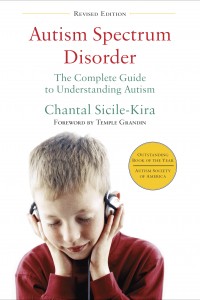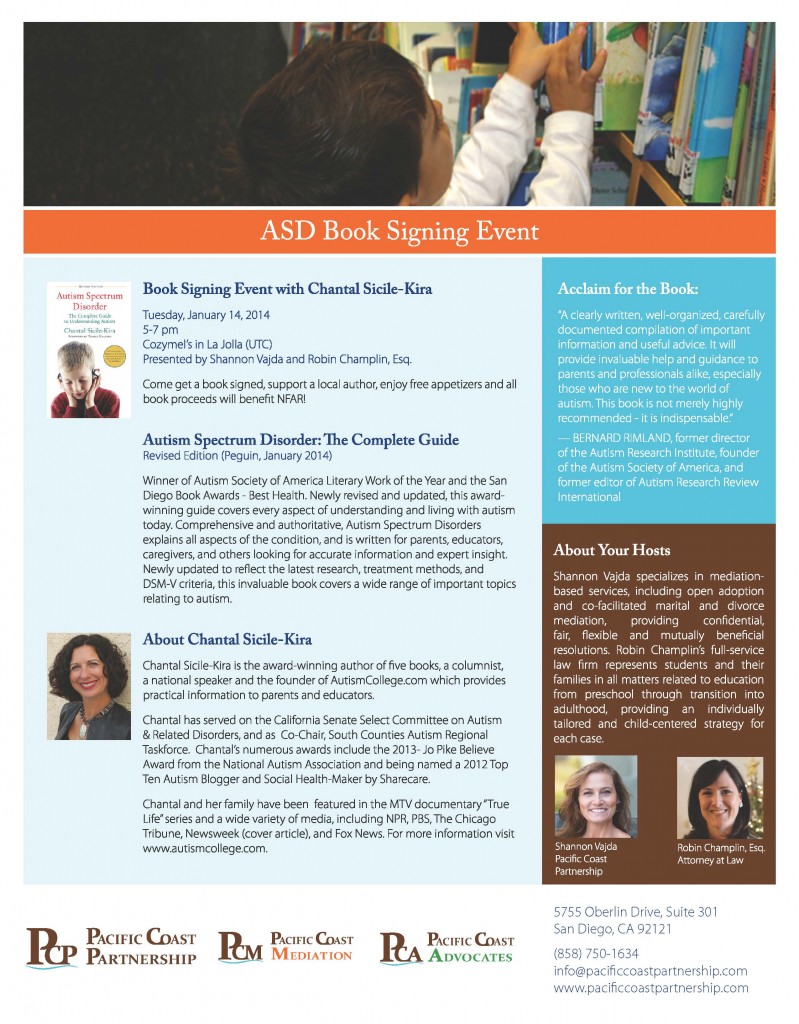Join us! Free Appetizers!
Tuesday, January 14, 2014
5:00- 7:00 pm CozyMel’s in La Jolla (UTC), San Diego CA
Proceeds of book sales that evening will benefit NFAR
Ten years ago my first book was published by Penguin and won a few awards. I’m thrilled to announce that I spent the past year revising that popular book, and the Revised Edition is now available. It has a slightly different name – Autism Spectrum Disorder: The Compete Guide to Understanding Autism. To celebrate the publication of this updated book, a fundraiser book-signing event is taking place in San Diego. I’ll be on-hand to sign books. Proceeds of book sales that evening will benefit NFAR. Shannon Vajda and Robin Champlin, Esq. are sponsoring the event. So come get a book signed, enjoy some free appetizers, and support a local autism organization!
About Your Hosts – Shannon Vajda (Pacific Coast Partnership) specializes in mediation-based services, including open adoption and co-facilitated martial and divorce mediation, providing confidential, fair, flexible and mutually beneficial resolutions. Robin Champlin’s full-service law firm represents students and their families in all matters related to education from pre-school through transition into adulthood, providing an individually tailored and child-entered strategy for each case.
About NFAR – NFAR’s mission is to help in the development, expansion and support of autism programs and services that improve the quality of life for children and young adults with autism in the San Diego Region.
About the Book – Newly revised and updated, this award-winning guide covers every aspect of understanding and living with autism today. Awards for the book include Outstanding Book of the Year – Autism Society of America, and Best in Health – San Diego Book Awards. Comprehensive and authoritative, Autism Spectrum Disorder explains all aspect of the condition, and is written for parents, educators, caregivers and others looking for accurate information and expert insight. Newly updated to reflect the latest research, treatment methods, and DSM V criteria, the invaluable book covers autism from diagnosis to adulthood.
Praise for the Book
“This updated version of Autism Spectrum Disorder is as indispensable as the award-winning original. This well-documented guide offers clear answers to difficult questions and recommends the important resources that parents will find the most useful. Since the first edition was published, Chantal has written four more essential books while raising her son who is now a young man. She’s done the research so the reader doesn’t have to! Her abundance of practical knowledge has been compiled into this user-friendly updated edition that both parents and professionals will want to keep on hand to refer to time and time again. Truly a must-have!” – Ricki G. Robinson, MD,MPH, member Scientific Review Panel of Autism Speaks; Medical Director, Profectum; and author of Autism Solutions: How to Create a Healthy and Meaningful Life for Your Child
“If I could recommend just one book to families and professionals, this is it! In “Autism Spectrum Disorders”, Chantal Sicile-Kira shares her immense knowledge, personal experience and insightful advice for families affected by Autism. She guides readers along the journey from diagnosis through adulthood, including an extensive compilation of resources and “food for thought” throughout. This isn’t a book that you’ll read once and place on a shelf, it’s an invaluable resource that you will continue to refer to for years to come.” – Wendy Fournier, President of the National Autism Association
“Autism Spectrum Disorders is a tremendous resource for families caring for children and adults with autism. While sharing her personal experiences of a parent of a child with autism, Chantal Sicile-Kira provides insights and resources that are often missing from many of the books on this topic. Quite simply Autism Spectrum Disorders simplifies many of the complications that families face in navigating systems of care and in doing so, she gives families hope and great inspiration.” – Areva D. Martin, Esq., Co-founder and President, Special Needs Network, Inc.
“For over 30 years I have treated visual developmental delays for those with ASD; I think I have made a difference. But my contributions pale in comparison to what Jeremy has taught me through his work in Vision Therapy, and what Chantal has taught me as a mother and author. This book will become a life-long companion for those who want to make a difference in a life – a life with autism or not.” – Carl G. Hillier, OD FCOVD, Clinical Director: San Diego Center For Vision Care
“A Clearly written, well-organized, carefully documented compilation of important information and useful advice. It will provide invaluable help and guidance to parents and professionals alike, especially those who are new to the worlds of autism. This book is not merely highly recommended-it is indispensible.”- Bernard Rimland, Ph.D., Past director of the Autism Research Institute, founder of the Autism Society of America and past editor of Autism Research Review
“This is the book we’ve all been waiting for. It is an essential source of information and advice in plain everyday language that can help anyone who is affected by autism today, from the parent of a newly diagnosed child, to someone who has been in the trenches for years. Kudos to Chantal for providing us with this long overdue, user-friendly, how-to guide for dealing with autism.” – Portia Iversen, Cofounder, Cure Autism Now Foundation (CAN), member Innovative Technology for Autism Advisory Board of Autism Speaks, author of Strange Son
“The essential book that parents, health professionals, and a wide readership will reach for in order to fathom this confounding condition.” —Douglas Kennedy, author of Leaving the World, The Moment, Five Days and The Pursuit of Happiness

